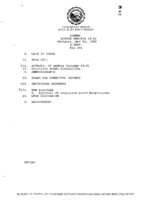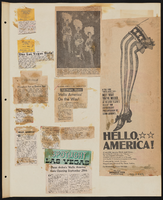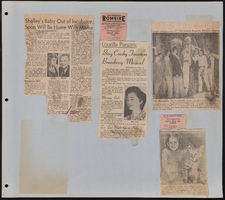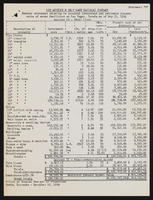Search the Special Collections and Archives Portal
Search Results

Transcript of interview with Sandra Peña by Lada Mead and Stefani Evans, March 27, 2017
Date
Archival Collection
Description
Sandra Peña’s story begins in East Los Angeles, where she spent her first fifteen years with her parents (both from Michoacán, Mexico), and her younger sister. The father's managerial position at Master Products allowed the family to live rent-free in a company-owned house behind the main factory, because he collected the rents for the company's two other dwellings. In this interview, Peña recalls the family move to Porterville, in California's Central Valley, her return to Los Angeles at nineteen, and her work with Parson’s Dillingham, a contractor for the Metrolink rail system. She draws the link between the Los Angeles and Las Vegas construction communities by describing her husband's move to Las Vegas to find work; a chance Las Vegas encounter with a friend from Chino, California; her ability to gain employment in Las Vegas at Parson’s, a company that had joint ventured with Parson’s Dillingham, and her move from there to Richardson Construction, a local minority-owned company. As Peña says, "It's kind of all intermingled. Even if you go here and you go there, it's like everybody knows everybody." Throughout, Peña weaves her family story into the narrative as she describes her youth, the birth of her son, the illness and death of her father, and her family's participation in her current employment with Richardson. As she remembers the people, places, and events of her life, Peña speaks to the ways one woman of color built on her interstate construction connections and rose in a male-dominated industry.
Text
Mabel Hoggard Papers
Identifier
Abstract
The Mabel Hoggard Papers (1903-2011) contain materials related to Hoggard's career as a Las Vegas, Nevada elementary school teacher, her research and civic interests in Las Vegas's predominantly African American Westside communities, and her engagement with civil rights issues. The collection also contains materials about Hoggard's life, including biographical newspaper articles about her childhood, education, work, and family. The collection includes lesson plans, scrapbooks, awards, correspondence, photographs, and physical objects such as a vinyl record and political pins. The bulk of the collection focuses on her life in Las Vegas from approximately 1946-1989.
Archival Collection

Lily Teo oral history interview: transcript
Date
Archival Collection
Description
Oral history interview with Lily Teo conducted by Stefani Evans on February 7, 2022 for Reflections: The Las Vegas Asian American and Pacific Islander Oral History Project. Lily Teo discusses her upbringing in Singapore, her education, her religious beliefs, and converting from Buddhism to Catholicism. She talks about her husband, her early married years, and what life was like as a young mother of three children. Teo shares how she started a catering business to feed construction workers and was responsible for shopping for ingredients, preparing all meals and tea, and cooking the food on site in her temporary kitchen. She talks about her children, the faiths they practice and languages they speak including English, Malay, and Mandarin, and the customs and traditions they practice, such as celebrating Lunar New Year and other holidays. Lily's daughter, Stella, sits in on the interview and expands on her mother's recollections.
Text

Lupe Avelar oral history interview: transcript
Date
Archival Collection
Description
Oral history interview with Lupe Avelar conducted by Marcela Rodriguez-Campo and Maribel Estrada Calderón for the Latinx Voices of Southern Nevada Oral History Project. Lupe Avelar describes her life growing up in Durango, Mexico on a family farm and her immigration to New Mexico as a teen with her brother before returning back to Mexico. Lupe talks about her marriage to Eladio Avelar and how the couple eventually moved to California as well as her circumstances of moving to Las Vegas. Subjects discussed include: cotton fields; cotton farming.
Text

Transcript of interview with Renee Diamond by Barbara Tabach, November 20, 2014
Date
Archival Collection
Description
In this interview, Renee Diamond discusses coming to Las Vegas via Los Angeles, with her husband and children in the 1970s and getting involved in politics. She talks about her husband, Leo, and his business selling vinyl records in L.A., and her work in a doctor's office. Once in Las Vegas, the Diamonds joined Temple Beth Sholom and later Congregation Ner Tamid. Renee talks about her involvement in the political arena in southern Nevada, including the League of Women Voters.
Community activism and social justice rank high in the legacy of Renee Diamond. She often refers to herself as one of the last of the generation without college degrees that could make a difference in the politics of the state. When Renee, her husband Leo Diamond moved their family to Las Vegas from southern California, the energetic advocate Renee quickly plugged into the community. The word "No" was not part of her vocabulary. Among the many Jewish and secular activities the she engaged in were: the editorial board of the Jewish Reporter newspaper; Hadassah; Anti-Defamation League; Red Cross Board; State Museum Board to name a few. She remains a vibrant Democratic Party leader and served one term on the Nevada Assembly in 1989. She was on the front lines as a fierce and active supporter of Welfare Rights, Fair Housing and the Equal Rights Amendment. It is a life that included working alongside illustrious women and men of Southern Nevada history. A list that includes: Harriet Trudell, Ruby Duncan, Myrna Williams and Dorothy Eisenberg and many more mentioned here. Meanwhile she raised four children and enjoyed a loving 43-year marriage with Leo (aka "Uncle Leo") whose career included the popular Bingo Palace, Slots-A-Fun and Stations Casinos. During this oral history interview she recalls the Las Vegas that she moved to in 1972 and reflects on what attracted people here, ways to be part of the Jewish life which might even include a bowling league and how involvement in raising social awareness was a worthy investment of ones' time. This is a look at a woman who made a difference.
Text

Meeting minutes for Consolidated Student Senate University of Nevada, Las Vegas, May 11, 1989
Date
Archival Collection
Description
Text




